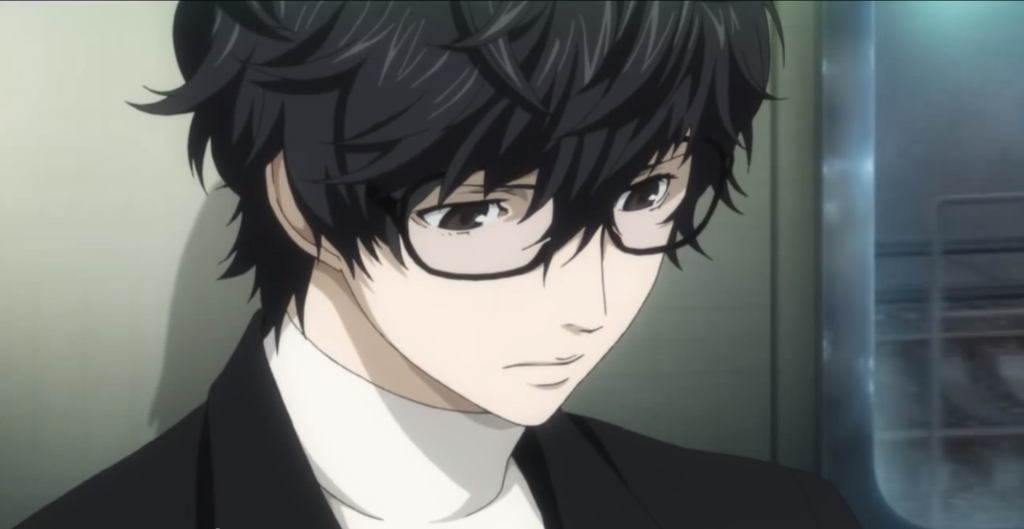
How Persona 5 Royals’ Mature Love Interests Reinforce Toxic Masculinity
Disclaimer: This article contains spoilers for Persona 5. Furthermore, this article examines sexual assault and abuse at length.
Lastly, a huge thank you to my editor, Ty Galiz-Rowe, who sat on a call with me talking about Persona 5 for a good hour, offered brilliant ideas, and helped me form this pitch. Promise I won’t keep making you think about this game.
I wish it weren’t so hard to love games sometimes. I wish I could go a couple months without reading about the horrific labor conditions of some AAA studio. I wish I could go a couple weeks without hearing about new discrimination or sexual harassment charges that someone somewhere—with some long, important title—stowed away for safekeeping. I wish games didn’t treat so many of my friends so poorly- my LGBTQ+ friends, my female friends, my friends of all varying sizes, colors, and ability… I wish there was no need for me to write tweet after tweet, and article after article, trying to explain what I’m sitting here saying now: I wish it weren’t so hard to love games.
For the longest time, I’ve considered Persona 4 Golden one of my favorite games. When I finished playing it, it stung to say goodbye and I honest to God considered starting the whole thing over, despite sinking 90 hours into it the first time around. However, here I am, six or so years later, terrified to go back to it. Throughout the years, Persona developer Atlus has found itself repeatedly in hot water for sexism, transphobia, and a plethora of other issues relating to discrimination. When my friends and I talk about the Persona games, or even some of their other titles such as Catherine, it always goes a little something like this: “it’s a fantastic game- apart from all the bad stuff which really sucks, but just try to push past it.” It’s been said to me. I’ve said it to others. But it gets harder to push past it. For that reason, I’m terrified to replay that game.
But they really do feel like great games, don’t they? I love playing Persona. I love the music, the gameplay, the style, and the characters. But the harder you look, the more cracks you see. The body shaming doesn’t stop just when the girl bends the bicycle in Persona 4 Golden. The transphobia doesn’t end when Catherine shows Erica, a trans woman, living life as a male in it’s “good” ending. Atlus’ ideologies inhabit their games, finding homes in various nooks and crannies where they rest insidiously, and it’s a hard truth to swallow.
As the studio releases definitive editions of their games, such as Catherine: Full Body and Persona 5 Royal, small changes here and there have been made as an attempt to sate those who criticize some of the more thoughtless parts of their titles. However, no amount of adjustments can alter the foundation a game rests upon– Atlus’ latest title, Persona 5 Royal, proves this.
In Persona 5 Royal, Atlus perpetuates their long-standing relationship with toxic masculinity by refusing to acknowledge the predatory nature and agency of the game’s mature love interests, choosing instead to portray them as taboo sexual conquests. It’s an issue that is overlooked and deeply rooted.
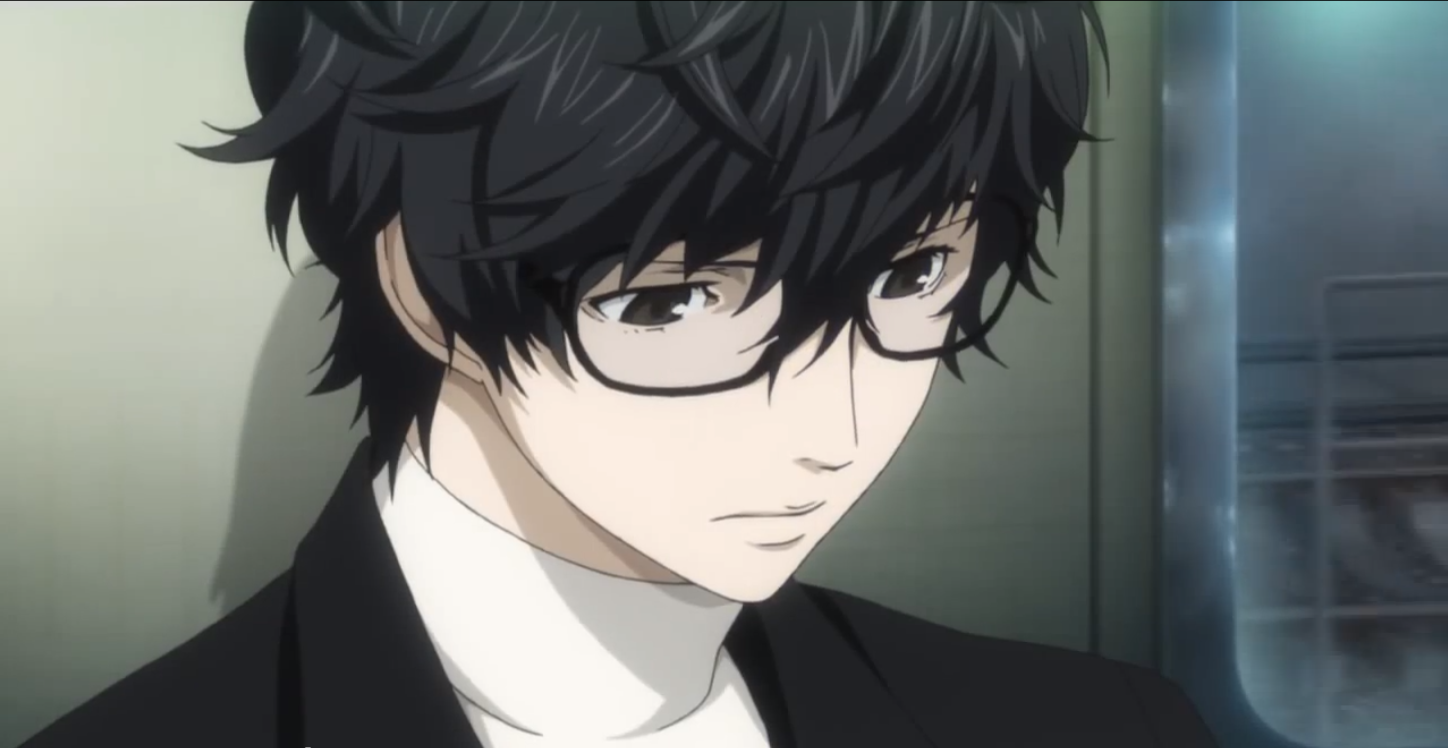
As a society, we tend to assume men are the ones who wield power and control in all situations. To lack agency is to lack masculinity– to be weaker, lesser, and deserving of mockery. In contrast, passivity is seen as a feminine quality. Women have historically been asked to relinquish agency, and when this does not occur, we deny its existence. In short, men tend to be actors whereas women tend to be acted upon– but we both know that’s not quite how things actually are.
Regardless of gender, we are all actors. We are all doers, makers, thinkers, builders, and ultimately, are responsible for our actions and choices. Of course it is vital to consider privilege when making such a statement, as the circumstances and opportunities surrounding someone greatly impact the scope of their actions. But nevertheless, the sentiment remains: when we strip women of their agency, we deny reality. While this is obviously harmful for women, it runs a lot deeper than that.
Toxic masculinity is the suffocating notion that men must adhere to a strict set of gender norms in order to be men- it disempowers women and emotionally devastates men. It’s an ideology that refuses to see men as victims– after all, how can they be when to be a man means to be the arbiter of one’s fate? To be a victim requires one to lose complete control of a situation, if only for a moment, and toxic masculinity doesn’t permit such “weakness.” It disregards the 1 in 10 men who have admitted to being coerced into sex, as well as the 1 in 14 who have reported being forced to penetrate someone. Just as sexism diminishes the power of women, toxic masculinity destroys the vulnerability of men– and they feed into one another ceaselessly.
It’s been said before that Persona 5 Royal is a game which revolves around the ideas of rebellion and control, and this is absolutely true. However this truth extends far beyond the surface. In Persona 5 Royal, we interact with the world as a young man. We are asked to manage our time, our skills, our combat, the actions we take, and the relationships we foster. Quite simply, the game brings to life the ultimate fantasy of complete control. Now this isn’t to say you don’t have certain obligations– you are, after all, a 16 year old school boy, even if this is a fact disregarded by most of those who should care for your well-being.
The element of rebellion is largely inspired as a reaction to the moral failings of the game’s adults and the systems they maintain. These abuses serve to progress the story, as well as forge the bond that first brings your party together– each and every member of the Phantom Thieves is processing trauma done to them by corrupted adults. Perhaps the most striking of these acts is the one that sets the whole thing into motion– the abuse and sexual assault of Shujin Academy students by teacher and volleyball coach Suguru Kamoshida.

As the game progresses, the infamy of the adults they seek to bring to justice only grows, seemingly in an attempt to both awe and overwhelm the player- to prove to us the stakes just keep getting bigger and bigger. But to me, there is no greater monster and threat than Kamoshida. While world-renowned artists, politicians, and mobsters generally feel quite distant from us, the bond between student and teacher is universal and well-understood. Teachers are inherently gifted a great deal of trust by both students and parents, and it seems well-deserved. These are the folks that have dedicated a great deal of their lives to providing education and guidance to children. They are placed in a position of authority and reliance, perhaps rivaled only by a child’s family, and to abuse that trust is simply unforgivable.
Kamoshida is depicted as a handsome, charismatic, and successful man. He’s a former Olympian and Shujin’s star faculty member. While many of the other villains in Persona 5 Royal fall back on tired physical characteristics to confirm their malevolence (old, overweight, bald, severe-looking…) Kamoshida is youthful, strong, warm, athletic, and handsome, with unkempt dark hair and a picture perfect smile. Your homeroom teacher, Sadayo Kawakami, confides in him, and your kindhearted peer Ann is quick to accept a ride to school from him on a rainy day. However, you soon find out this is a carefully curated facade that enables him to physically, verbally, and sexually abuse various students, culminating in an attempted suicide by one of them.
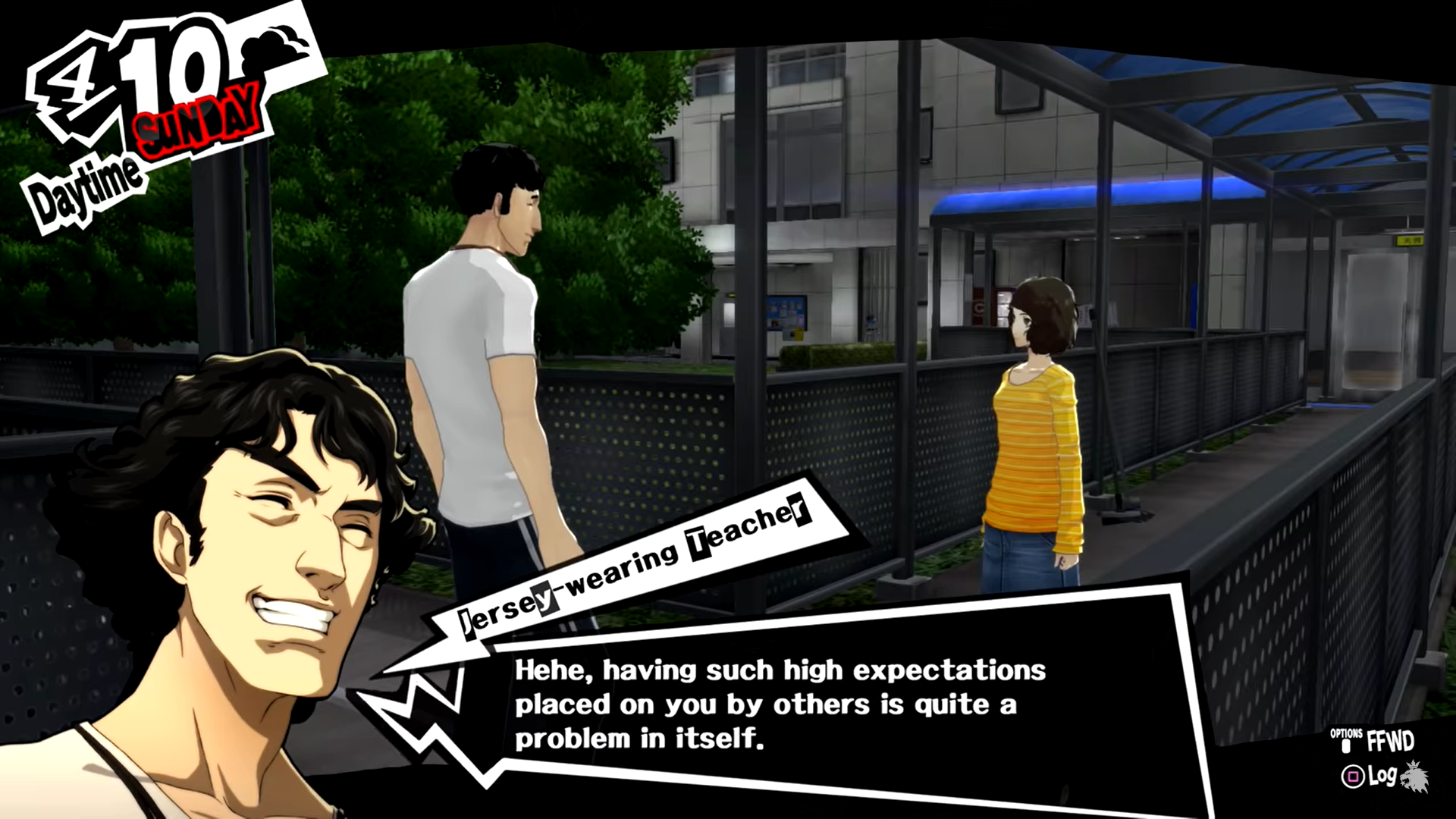
In the game’s first few hours, it is quite vocal about how shameful and monstrous it is for a person in a position of trust to abuse their power to hurt those they should be caring for– so why is this lesson completely forgotten a few dozen hours later? Where is this moral stance when your trembling homeroom teacher asks if she can stay at your place a few hours longer as you rest your head in her lap and the screen fades to black?
One of the most enjoyable parts of the Persona series are the bonds you form with the game’s NPCs, including romantic ones. The game doesn’t shy away from delving deep into interpersonal relationships, conflict, intimacy, and sex– it acknowledges these are realities for many 16 year olds, and permits us to explore them alongside our protagonist. In Persona 5, there are ten potential relationships you can enter– five of these are with your female classmates, one is with a girl from another school, and four of them are with adult women. While all four of those relationships deserve to be scrutinized, the two most troubling are the ones with Sadayo Kawakami, your aforementioned teacher, and Tae Takemi, your physician. In both instances, these are women in positions of power over your character.
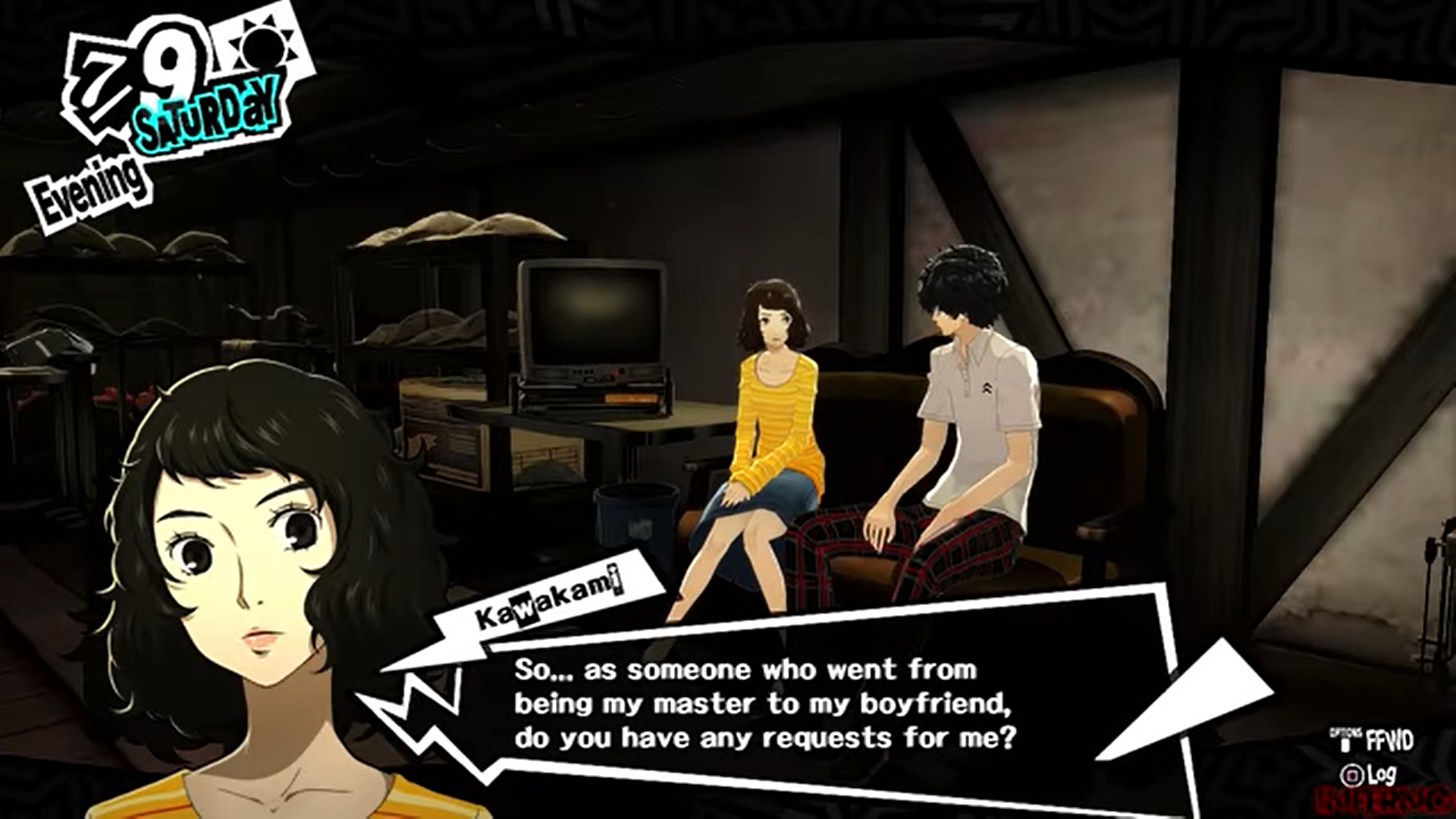 When you are first introduced to Kawakami, she is portrayed as an exasperated woman who resents the fact that a troublemaker such as yourself has been assigned to her class. She is frequently portrayed furrowing her eyebrows and sighing deeply as she expresses her frustration with both you and your rebellious pal Ryuji. However, the dynamic shifts when you, Ryuji, and a fellow male classmate decide to call a maid service—a profession closely associated with sex work—only to find the woman who’s come to service you is none other than Kawakami. While Kawakami initially tells you to forget about the whole ordeal, you become further involved when she is confronted by another who questions her nighttime antics– you quickly cover for Kawakami, stating she is actually your tutor.
When you are first introduced to Kawakami, she is portrayed as an exasperated woman who resents the fact that a troublemaker such as yourself has been assigned to her class. She is frequently portrayed furrowing her eyebrows and sighing deeply as she expresses her frustration with both you and your rebellious pal Ryuji. However, the dynamic shifts when you, Ryuji, and a fellow male classmate decide to call a maid service—a profession closely associated with sex work—only to find the woman who’s come to service you is none other than Kawakami. While Kawakami initially tells you to forget about the whole ordeal, you become further involved when she is confronted by another who questions her nighttime antics– you quickly cover for Kawakami, stating she is actually your tutor.
The perks of building up Kawakami’s social link are as helpful as they are concerning– while you want the perks of her bond, enduring her late night visits and being called “master” with a playful giggle is, for lack of a better word, a lot. As you grow closer, she makes it easier for you to ditch class and ultimately begins to offer you “special massages” that enable you to get more done in a day.
Throughout the entire relationship she questions her choices and reminds herself what she is doing is wrong and she shouldn’t rely upon you or your money, but nevertheless continues to do so. She also begins to reveal more of her insecurities and issues, her largest being complications with a former student leading to her being blackmailed. While she is initially seen as a disapproving authority figure, the game allows you the fantasy of having an older, capable woman physically care for you while you emotionally care for her. As she dons her maid uniform, she also dons the demeanor of a housewife eager to please her protector.
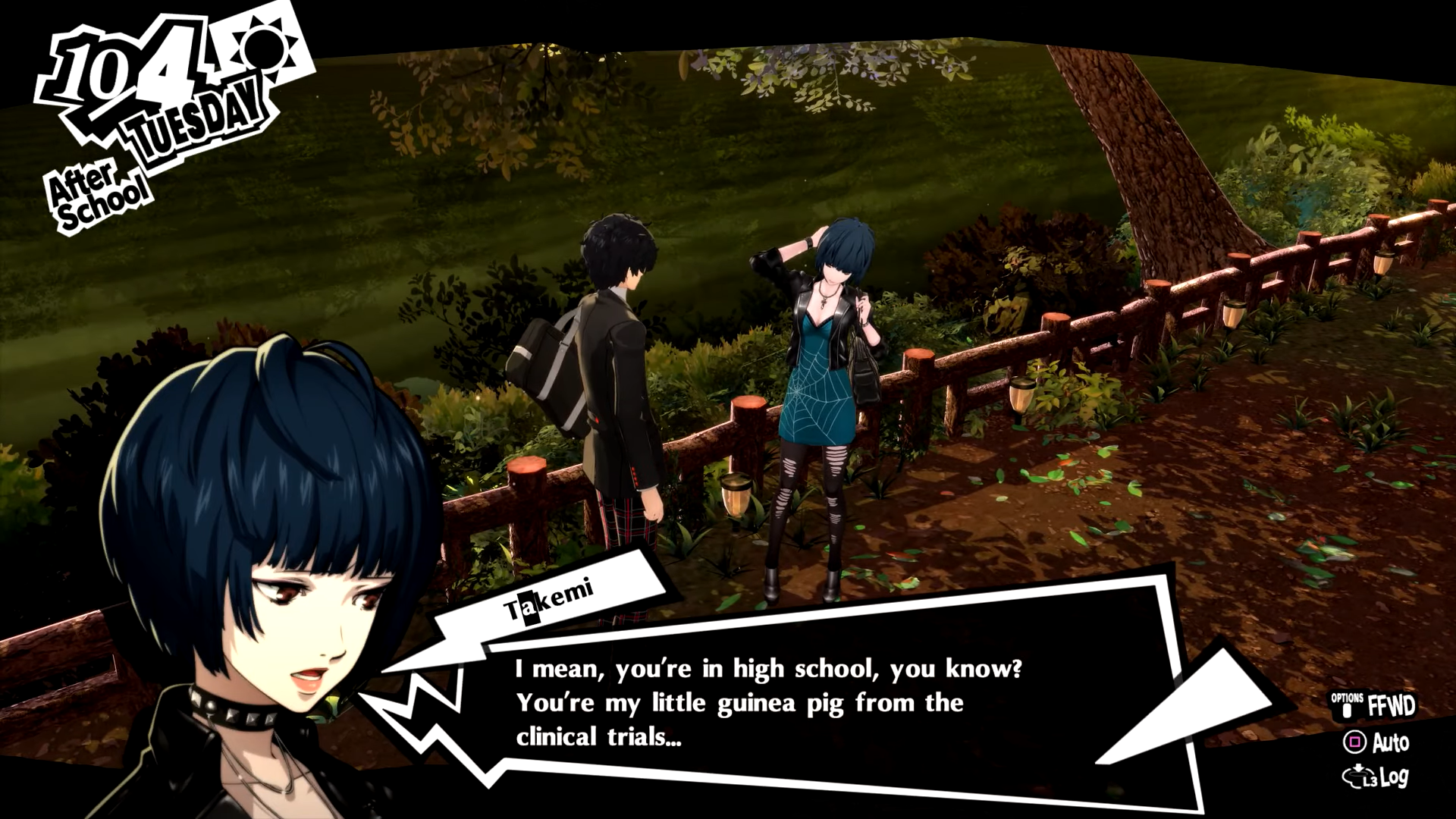
And then there’s Tae Takemi, the back-alley doctor of Yongen-Jaya. While you ultimately end up playing the role of Takemi’s hero and emotional support system, Takemi retains her authoritative tone and edge throughout your relationship- it’s all part of the fantasy she builds. Within minutes of meeting her, she gets you into her office, locks the door, and blocks it with an authoritative stance as she questions your motives for seeking her medical care. Clad in a short dress, long jacket, and chunky heels, she creates the illusion of a woman that is all legs and power. She is dark and no-nonsense, intimidating and cool– and above all else, when she crosses her legs and shoots you a sly glance from the side, she is tempting.
However, despite calling you an “idiot” for participating in her experiments that render you unconscious, she still agrees to strike a deal with you: if you are her “little guinea pig,” she’ll sell you illegal prescriptions that ultimately aid you in battle. In her medical trials, she asserts control over your body once you’ve proven you have enough “guts” to allow her to do so– even when she is allowed to take control, it is only because you are strong enough for this to occur without issue. The healing items she provides aren’t incredibly useful as the game progresses and you attain powerful white magic and more SP, but the affirmation of being so strong coming from a tough-as-nails, older woman seems to be the prize Atlus is offering.

Ultimately though, the question is this: in a game so fixated on the misuse of power and the moral failings of those in authority, why do we not view these women as corrupt or bad characters? In fact, why are none of the game’s villains women? Whereas every male cognitive palace you enter portrays them as inarguably evil, both the women whose palaces you enter are merely lost. Ultimately, it seems to come down to the idea that despite their morality, positions of authority, age, and their responsibilities as care providers, they are women– and women are innocent.
Even as a child under the care of Takemi and Kawakami, you are made to feel as if you hold power over them. Without your “guts” and words of encouragement, how could Takemi have saved her practice, tested her medicines, and overcome her reputation as “the plague?” Without your financial support and discretion, how could Kawakami continue to pay her debts and keep her teaching position? And of course, without your power as leader of the Phantom Thieves, who would have put a stop to the people holding them down? Despite these women having power over us in countless ways, it is presented as if we are their saviors. We are not allowed the luxury of youthful innocence and reliance. We are a man. We are relied upon.
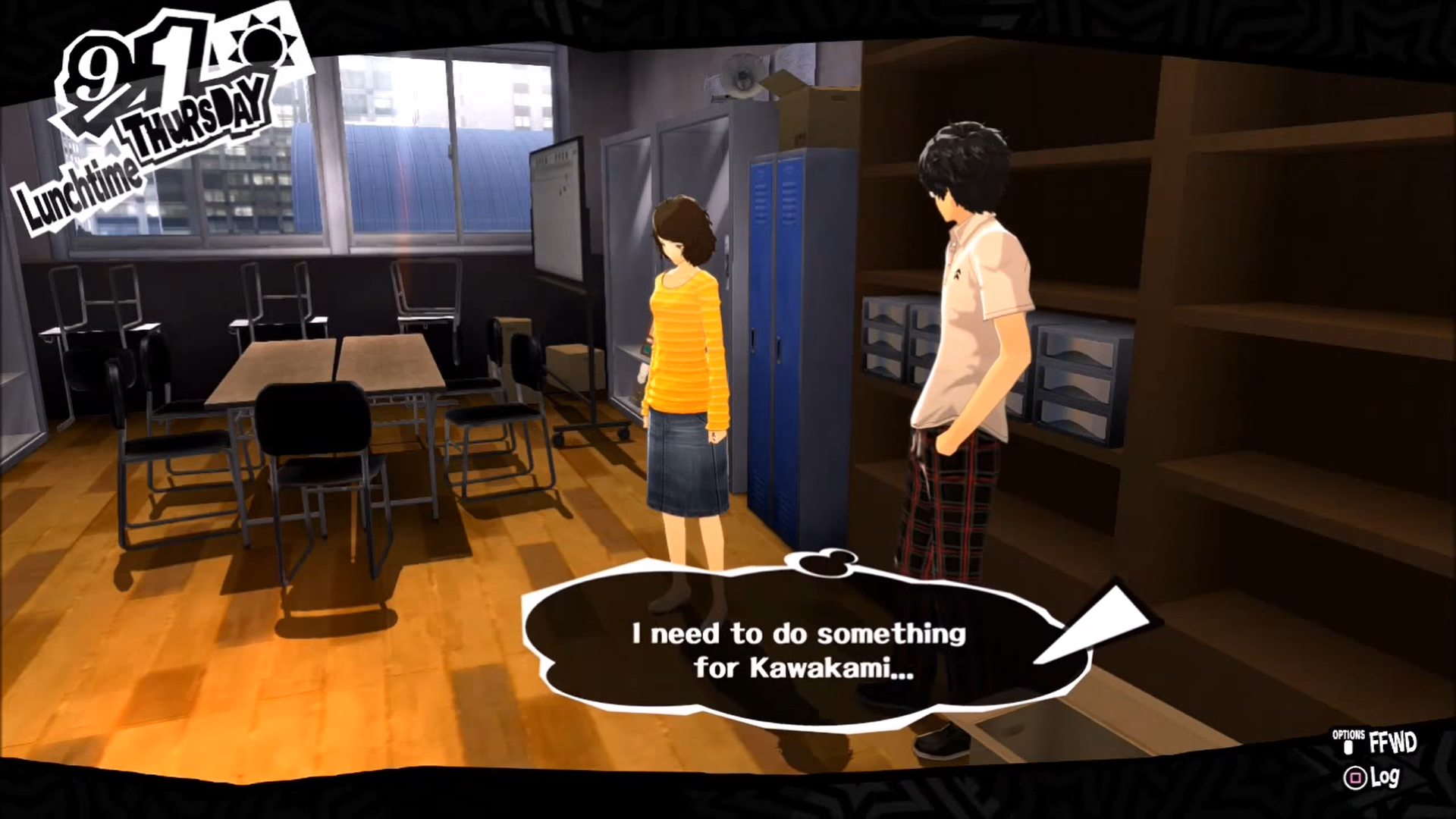
We are led to believe we drove them to our arms– we achieved the unachievable and made them long for us. We don’t stop to consider we are not guiding them to this choice, but rather, as adult women, they are electing to sleep with a minor. Like Kamoshida, these women are presented as extremely attractive, but unlike Kamoshida, their perceived lack of agency allows us to distance ourselves from viewing them as predators and merely take in their attractiveness- they are not predators, they are prizes. Furthermore, the game prevents us from seeing their behavior as repulsive because, once again, we are a man. Men are expected to want, especially from attractive women. If they don’t—if they are to wait, question, or resist—society tends to perceive this as a failing of the man. Men are actors– so act.
There’s more that could be said about Atlus’ moral stances here. We could throw into question why the game lets us have these relationships with adult women while refusing to let us enter a gay relationship. Hell, we could dive deeper and question why the primary example of queerness in the game is in two unnamed men who ignore a character’s repeated nos and violate his body as a comedy bit. We could dive deeper, absolutely, but I won’t retread old ground when what’s vital to me right now is bringing light to something I don’t think has been considered nearly enough.
Despite Atlus being repeatedly called upon to make socially conscious changes to their games and “do better,” the studio continues to release titles that, at their core, are entrenched in harmful ideologies. Persona 5 Royal carries on this tradition, and while it’s simple to acknowledge and overlook the more blatant ways in which the game is problematic, it is the insidious ways these ideas manifest that are more difficult for players to detect, and lead to the subtle indoctrination of beliefs that hurt us all.






Agreed… I really like Takemi, but it was uncomfortable when my player character was an actual child. They don’t even shy away from that fact! Takemi points it out repeatedly!
I’m an adult male and I remember being very uncomfortable with those two relationships when they progressed far enough, playing as joker was very awkward for those parts and I avoided them.
Having read the full article, I have to say it made me rethink a lot of what I had experienced playing the game. Kamoshida was a total scumbag, a rapist and he tortured all of the boys on the volleyball and track team. Something you didnt really delve into. Yes, you are correct that they turn a blind eye to what is going on with the intimate relationships you have with the females, sure, but to compare the female confidants in the game with the bastard of Kamoshida and say they should be 1:1 is unfair. Loved the article though, for sure.
A few things, you state multiple times that as a man main character that we hold a sort of power over kawakami and takemi when we are just acting as someone for them to lean on, we appear as the main character to allow them to vent their frustrations and give advice, this is the same for ALL lines of the confidants within Persona 5, I don’t necessarily think that a bad thing since it allows you to see the emotions of well written characters.
You can’t logically think of takemi or kawakami as “predators” because the minimum legal age of consent within Japan (which is where the game is set) is 13, while yes many areas prohibit sex with a person under 18 we do not know if that is the case within persona’s Japan because Kamoshida is shunned because he used his position to sexually assault and beat students, not because of any paedophilia, also making mention to Kawakami stating that she “shouldn’t be doing this” isn’t because of the age gap, but of the fact they are teacher and student.
I also take issue with the idea that kawakami and takemi, as you state, are “prizes to be won” I don’t believe that they are like that at all, as much as all the other love interests. Each of them have a unique and interesting story, kawakami you aid in her problem of being blackmailed, takemi in being shunned from the medical world due to no fault of her own, you are compelled by the game to be someone for them to fall back upon, to be someone they can talk to about their problem, while yes it is common knowledge that if you follow their respective paths you are given the option to date them, the game isn’t pushing a “if you do this you can date them!” message, I don’t think the game shows anything like a “power” over them in the slightest
Other then those points I agree with you completely, much love
Finally! Thank you so much for talking about these relationships. The game undermines its own message and ultimately hurts the game. At first, I loved P5. I loved how it questioned what we are told is “right” and asks us to question society, and ourselves, in turn. It showed how horrible power imbalances are, and the abuse and consequences that stem from that abuse of power. But as I stated explaining it to a friend, I thought more on it, and realized how messed up it is with allowing you to have romantic relationships with women who are much older than you, inherently creating a power imbalance. And let’s not forget that you can’t consent to sexual relations at 16 years of age. Just like having the ability to have a romantic relationship with Futaba who is a few years younger than you and you have a huge power imbalance with her! And yet we aren’t allowed to have romantic relationships with other boys our age? It infuriates me.
I have to agree. The first time I played the game I was appalled to learn that you could date older women while being a minor. It was also uncomfortable to watch the protagonist basically be molested by his physician or his teacher call him “master” while making sexual innuendos but it’s okay because he’s a man and having any kind of female attention especially from “badass” women is cool. And as you said, it’s easy to look away because it’s fiction, right? It seems though that this isn’t the first time Atlus has sprinkled their toxic idealogy into the games.
This was a very well thought out article! I enjoyed it immensely. 🙂
Despite its obvious shortcomings, I still love the Persona franchise, but I wish it could grow from supporting this unhealthy trope that takes place in several forms of anime-like media. In general, the trope is sometimes portrayed as a joke, but it really should be phased out entirely, as predatory behavior isn’t something we should take so lightheartedly. I’m glad to see someone bringing it up in a well reasoned, and cool-headed manner.
Thank you for writing this. While I still do love these games for the stories and topics they do explore well, I think it’s important to discuss the things in media you love which they get wrong. If we don’t bring up these topics and talk about the ways in which they might be harmful, we can’t expect them to improve in the future.
Looking at the points of criticism I can’t help but feel most of them are made from compete ignorance instead of malice. The fact that, as you point out, the confidants with adult women seem to contradict the message of the Kamoshida arc says to me that they just didn’t put enough thought into the deeper connotations of what they were writing.
And don’t get me wrong, I’m not trying to excuse them. If anything it makes things worse, since I can’t help but wonder if Atlus’ relatively small team is biting over more than they can chew with these massive games. I have no way of knowing how the work environment is at Atlus, but it could hint at a culture where thinking through the logical ramifications of what’s being written isn’t something that is made time and space for.
This was a pretty interesing point of view, you are right about that is very weird that you can date adults in this game, in my opinion you shouldnt be able to date adult instead you can be good friends with them or have a wholesome relationship between student and teacher.
Agree, it was weird. Even weirder is that I couldn’t choose to date Ryuji. I just really wanted to date Ryuji. 😀
Finally. Though I’m sad this message had to come from a fellow woman, thus reaffirming the complacency of the series’ male fans, I’m glad it was said.
For me, the worst thing is the treatment of Ann. So much of her resonates with me– being the only white girl in a community of non-whites, having to move a lot as a child, being misunderstood as a cold person, and being goofy to the point people think you’re an airhead. (Love that female stereotype…)
After finally taking her life back, she is subject to flirting with and titillating people for the sake of making progress in the story. Nearly having to pose nude and having Ryuji and Joker tell her she will if things go south on their end of the plan. Having to wear a bikini and be almost molested by the former noble in palace 7.
Male fans like to paint it as Ann becoming “comfortable” with her sexuality and owning her curves, and they point to the fact that she lets Ryuji ogle her in Hawaii as the point where she has made peace with her sensuality. They say that she doesn’t care anymore.
I’d like to tell them to look closer at that cutscene and notice Ann’s discomfort at Ryuji, which prompts her to quickly pal around and act like nothing is wrong. She is not comfortable, she is very much uncomfortable and is looking for a way to take their minds off of her books.
Also, just because a woman wears a bikini does not mean she enjoys being treated like an object! The men of the fanbase basically say she asks for it by wearing a bikini– if she wears such revealing swimwear, surely she doesn’t mind putting a bikini on against her will and groped by a Shadow!
This is my first P game, and after I play P3P, probably my past. I rushed to buy Royal during a sale when I was still only on Madarame’s palace, and I am kicking myself for it.